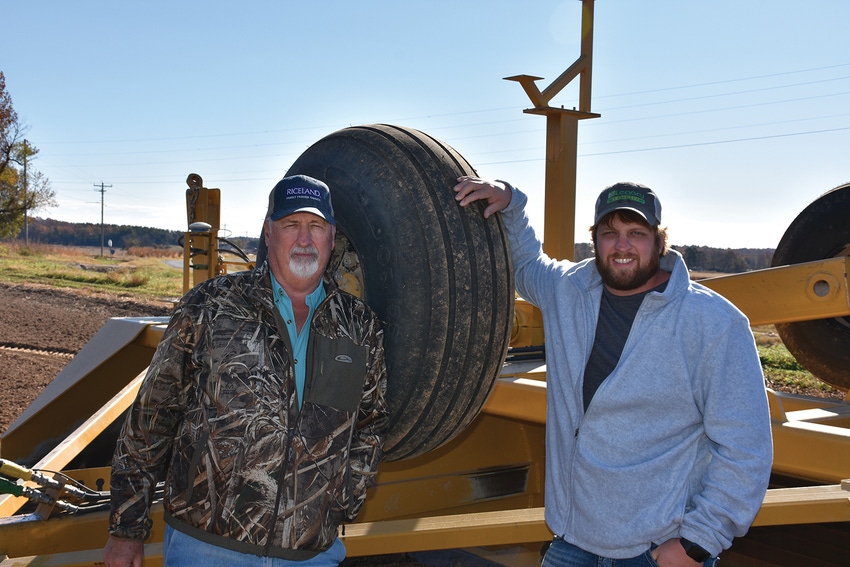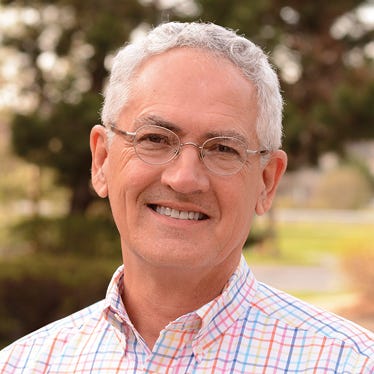
Zero-grade, level basin rice production may not work for everyone, but Jason Boyd has a plan of action for his 2,600-acre rice and soybean farm in northeast Arkansas to keep his land sustainable and productive using the system.
Boyd is the fifth generation of his family to farm on the land in Greene and Clay Counties and plans to continue the tradition of passing it on to those who come after him.
"If it's not sustainable, we can't pass it on to future generations," he said. He believes that zero-grade rice production will allow him to keep his land productive into the future.
The Boyd farm abuts the western slope of Crowley's Ridge, the geological formation that rises above the alluvial plain of the Mississippi embayment in eastern Arkansas and Missouri. Rice is grown on both sides of the ridge and production techniques vary depending on soil type and the personal preference of individual growers.
"Our land holds water well and works up good," Boyd said of the land on which they have zero-basin leveled all but about 50 acres and are currently preparing for the next season.
By flat leveling their fields, which average 40 acres each, they don't have to use levees to manage unleveled fields. Each plot drops into another slightly lower field. They manage their water so by the time the water reaches the lowest field in the series there is no runoff.
The system saves a lot of time and money, according to Boyd.
"You reduce your water, you can no-till it and reduce your inputs," he said. "You reduce your equipment needs — way less labor. Everything about it is much more efficient. You're not having to go out and build up levees and then knock them down again."
He noted that levees are hot beds for weed growth.
"You don’t get pigweed in the field with zero grade because the entire field is flooded," he said. "And, it seems to me that the zero-grade dries up faster than the other stuff."
Boyd said that his zero-grade beans, following rice, have traditionally out yielded his beans that were watered down a row with poly-pipe. He does put beds in the level ground for the beans, but just floods up the plot when it needs water.
In the winter, he holds water in the fields which again reduces potential weed growth.
When it comes to harvesting the crops, it's much more efficient to run a combine through a field that is level because there are no levees to work around. Harvest can run faster down a straight row.
2020 Season
The 2020 season started out slow for the Boyds. Jason anticipates getting into the field about the first of April each year. This year it was cold and wet.
"I planted about 400 acres around April 17 and then we didn't get to plant anymore until the end of May," he said.
When he planted the rice in May, it was flown on by air, because it was too wet to plant with an air seeder, which is what they normally use when the soil is dry enough.
Jason's dad, Robin, noted that there are usually short periods of opportunity to plant in the spring.
"Most of the time we've got a pretty narrow window to get our rice planted," Robin said. "Sometimes you get good weather conditions where you have plenty of time, but that doesn't happen too often. Most years, it's middle to late April before we're actually able to get rice in the ground."
This year, despite an extended planting season and residual moisture from hurricanes that came up into the Mid-South from the Gulf of Mexico, the Boyds said their crop has been roughly average.
"The hurricane did blow my beans over," Jason said. "A tornado, I'm pretty sure, got one of my rice fields."
But overall, he said that the rice variety he plants, a RiceTech hybrid variety, 753, stands up well to storms.
"The yields were decent this year, but it's hard to say how everything affected them," Jason said.
Leveling the fields
It was shortly after Robin began farming in the late 1970s that he began grading fields.
One particular year, growers were incentivized to layout from producing rice. Robin was able to go in that layout year and level many of his fields to start fresh with the new system.
Robin explained that his father did not want to layout his fields that year, while Robin was leveling his ground.
"I got more out of my rice the following year and made more money than he did," Robin said.
Now 40 years later, Jason is convinced that system is the only way to farm rice for him and Robin has stepped away from day to day management.
Robin still hangs around to help out if needed, but is more interested in taking the time to do what he enjoys, showing pictures of two stock cars, talking about fishing and a project he had that day with his boat – more fishing?
Jason is focused on the operation, making sure that everything runs as efficiently as possible.
"The name of the game now is efficiency," Jason said. "And, I can't think of a more efficient way to grow rice than zero-grade. That and our water conservation and no-till practices"
Dry weather was pushing Jason to get ground prepared for next season when Farm Press spoke to him.
"We're running right now, working ground," he said. "A lot of times we can't do it in springtime because it gets too wet. It's dry now and we're doing what we can."
If a field develops ruts or unleveled areas, Jason runs a finishing bucket over it to relevel. GPS pods on each side of the bucket level the ground to two or three hundredths of an inch according to Robin.
Robin also built a 40-foot stubble roller to help eliminate ruts in the field years before larger commercial rollers were available. Earlier rollers were only 20 to 25 feet wide which could cause holes in the field when they turned. Robin's version was wide enough not to sink in the wet soil and has teeth on the roller that pushes the stubble into the ground.
Runoff is controlled and eliminated as irrigation is planned and held at the bottom end of the series of fields. Jason works closely with his crop consultant to ensure that fertilizer levels and insect protection is monitored to optimize production.
It is these kinds of tweaks on the farm that keep the efficiency level high on the Boyd farm and chances are, Jason will be passing the farm on to a next generation when he decides to step aside.
About the Author(s)
You May Also Like






